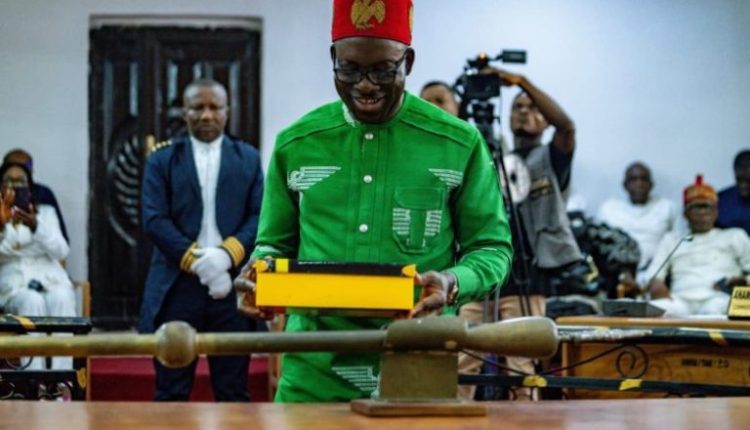Anambra Governor Soludo presents ₦757.8bn 2026 budget, promises stronger governance
|
Getting your Trinity Audio player ready...
|
By Sunny A. David, Awka
Anambra State Governor, Prof. Chukwuma Charles Soludo, on Tuesday presented a ₦757.88 billion budget proposal for the 2026 fiscal year to the State House of Assembly, describing it as a strategic plan to deepen the impact of governance across the state.
The proposed budget is 24.1% higher than the 2025 estimate of ₦606.99 billion. Soludo said the increase signals his administration’s renewed commitment to delivering results for the people.
Recurrent expenditure: ₦162.6 billion (16.6% increase); Capital expenditure: ₦595.3 billion (26.3% increase); Capital projects: 79% of the budget and Recurrent spending: 21%.
Soludo said the budget is designed to prioritize investments that will produce visible and measurable improvements across the state.
The fiscal proposal has a ₦225.7 billion deficit (29.8% of the total). According to the governor, the deficit may be financed through a combination of privatization proceeds, improved internally generated revenue (IGR), and concessionary loans tied strictly to viable projects.
He stressed that his administration has not borrowed to fund any previous budget deficit, and depending on the speed of project implementation, may not need to borrow in 2026.
“Our fiscal discipline remains firm,” Soludo said.
All major sectors recorded year-on-year increases: Administrative sector – 12.2%; Economic sector – 26.7%; Social sector – 31.4%; Education – 46.9%; Health – 13% and Infrastructure – 27.7%.
Soludo noted that the increases reflect the state’s priorities security, infrastructure and economic transformation, and human capital development which jointly account for over 70% of the entire budget.
The Governor highlighted ongoing work on strategic road dualization, bridges, flyovers, and mass transit systems. Water transport will also be expanded through new jetties and boats.
He added that public–private partnerships will play a major role in delivering the proposed Rail Masterplan.
He also announced progress in flagship development projects including Awka 2.0, Greater Niger, and the Aerotropolis/New Industrial Commercial City. Construction of the new Anambra Mixed-Use Industrial City is scheduled to begin in 2026.
Soludo reaffirmed his commitment to free, quality education. Construction of public primary schools will begin in 30 of the 76 communities that have never had one. The State also plans to establish two new specialist tertiary institutions and continue upgrading existing primary and secondary schools.
In the health sector, the government will complete ongoing projects, including the College of Nursing and a new oncology focused teaching hospital, while modernizing other health facilities across the State.
The administration will also scale up youth-oriented training programs, while completing the Solution Innovation District (SID) building in partnership with the private sector.
Soludo pledged to improve access to clean water for households and industries. Work is also intensifying on expanding electricity supply, particularly in underserved communities.
He noted that the State has already set up the Anambra Electricity Market, inaugurated the State Electricity Regulatory Commission, and secured regulatory transfer from NERC under the 2023 Electricity Amendment Act moves that open the door for more private sector participation.
Anambra, he added, continues to enhance its investment climate and remains attractive to both local and foreign investors.
The government will support vulnerable households with improved crop seedlings such as coconut, palm, ukwa, pawpaw, and soursop.
Grants will also be extended to micro-businesses across the 326 wards to promote inclusive economic growth.
Soludo commended communities and partners funding local development projects roads, schools, hospitals, and security initiatives. Counterpart funds have been provided in the budget to strengthen collaboration with the federal government, development agencies, and the private sector.
Although Anambra ranks first in fiscal transparency and sustainability, Soludo admitted that IGR remains the state’s weakest point.
He announced a technology driven revenue overhaul aimed at blocking leakages, widening the tax base, and improving compliance.
He emphasized strict borrowing rules: loans must be concessionary and used only for projects capable of repaying themselves.
“No borrowing for consumption. No borrowing for frivolity,” he stated. “Only borrowing to build assets and secure our future.”
The governor expressed gratitude to government institutions, civil servants, teachers, traditional rulers, religious leaders, youth groups, women, students, and communities for their continuous support.
“I assure you that every kobo entrusted to us will be used prudently and transparently,” he said. “Together, we will keep building the prosperous, livable, smart homeland we envision,” he said.



Comments are closed, but trackbacks and pingbacks are open.